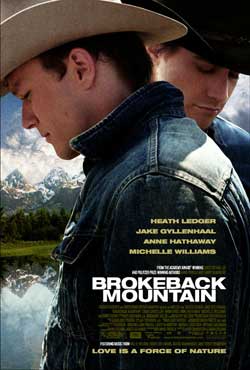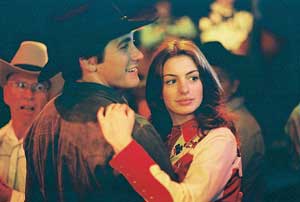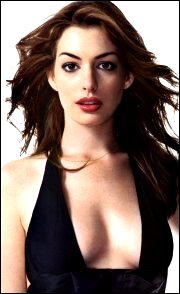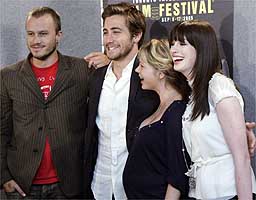 Anne Hathaway is beautiful. Not just attractive, or just pretty, but flat out beautiful. I didn’t know she would be attending the New York City press day for Brokeback Mountain (you can imagine my research regime before one of these things), so it was a very nice surprise when she walked into the room.
Anne Hathaway is beautiful. Not just attractive, or just pretty, but flat out beautiful. I didn’t know she would be attending the New York City press day for Brokeback Mountain (you can imagine my research regime before one of these things), so it was a very nice surprise when she walked into the room.
In Brokeback she plays Lureen, the wife to Jake Gyllenhaal’s gay cowboy Jack Twist. The film spans twenty years, and she does the most convincing aging in the picture. She goes from young and flirtatious to older and hard, and every step is believable. Beautiful and a good actress!
It should be noted that the questions about nudity are among the ones I asked. And that the "And he runs them!" comment was aimed at me. Oh, if you could only see the creeped-out look Hathaway gave me then.
Q: Madonna says that the sex in this film is shocking.
Hathaway: Madonna said it’s shocking? Madonna saw this film? I didn’t get that memo! I want to know what the Material Mom sees.
Q: I didn’t think it was shocking.
Hathaway: I didn’t either. What I like about it is that it’s pretty evenly distributed across the film, with both men and women. Usually us girls bear the unfair share of it. I didn’t think it was very shocking. I thought it was very real and tastefully done. I didn’t feel uncomfortable about it. Maybe it was shocking for my dad, but that was just because of me.
I think it’s really overhyped. I think the thing that emerges from the film is the have such love for each other that even as their sexual relationship slackens their intimacy deepens. I think that’s really what the film becomes about, that they have a connection together that they don’t share with anybody else on Earth.
Q: Your new hairdos in this film get a laugh.
Hathaway: What do you think? Should I become a blonde?
Q: By the third one people are really laughing. Did you work with the costume designer to get those looks of the various years?
Hathaway: Oh yeah, we all worked on it. Lureen liked to be the center of attention. She was wild, she was a predator. She liked to do things whole hog as she would say. Yes, it was very important. She’s a tough girl, but she’s a girl’s girl. She’s a daddy’s girl. She’s from Texas, and she wanted to look good. She was kind of doing her small town versions of the big city styles from the time.
Q: Did you keep any of the outfits?
Hathaway: Oh no. I did keep a pair of my cowboy boots, though. They were so comfy I wore them everywhere.
Q: I’m sure Disney would be happy to have you do movies for them forever –
Hathaway: Really? They haven’t asked me for a while.
Q: Well, it seems between this film and Havoc you have a real chance to work with some more complex projects. Was it a decision to move that way? Hathaway: I didn’t even think about in those terms just because I don’t know if you’ve noticed I work sparingly. Considering that The Princess Diaries came out 5 years ago, I haven’t done that many movies. I wanted to wait and find roles that moved me. It’s interesting because when I was 20 I was still interested in doing the female empowerment, heroine stories. But after that it was like, wait a minute, let’s go to a new place. I went through so much in my own life in between the roles that made me grow that it had nothing to do with trying to escape an image, or being typecast. It had to do with doing stuff I believed in at that moment. I never give any credit to the theory of typecasting because I knew who I was before I made The Princess Diaries, and I knew what I had to offer. I knew that I could always offer more than that film. I love that film, but it’s not the most demanding of roles. So I always wanted to go out there and get back to my character actress roots.
Hathaway: I didn’t even think about in those terms just because I don’t know if you’ve noticed I work sparingly. Considering that The Princess Diaries came out 5 years ago, I haven’t done that many movies. I wanted to wait and find roles that moved me. It’s interesting because when I was 20 I was still interested in doing the female empowerment, heroine stories. But after that it was like, wait a minute, let’s go to a new place. I went through so much in my own life in between the roles that made me grow that it had nothing to do with trying to escape an image, or being typecast. It had to do with doing stuff I believed in at that moment. I never give any credit to the theory of typecasting because I knew who I was before I made The Princess Diaries, and I knew what I had to offer. I knew that I could always offer more than that film. I love that film, but it’s not the most demanding of roles. So I always wanted to go out there and get back to my character actress roots.
Q: So the nudity that film, and in Brokeback, isn’t your way of telling everyone that you’re an adult now, that you’re all grown up?
Hathaway: No! Come on, you think I would do anything that obvious? That’s pathetic.
Q: I have no idea. That’s why I’m asking.
Hathaway: If The Princess Diaries had required nudity, I would have done it.
[the room explodes in laughter]
It would have been the unrated version, but Julie and I would have popped our tops. No, but, before I did Princess Diaries the script for Traffic came up, and every young actress in Hollywood auditioned for that. The script required nudity and I auditioned for it. It’s not something I have any issue with. It’s because I made these movies that are family films and appealed to a lot of people’s moral sides – there’s nothing wrong with that, mind you – a lot of people assumed those were my morals, and they’re not. I’m very different from the characters I played in those, and I take it as a compliment that I played them well enough that people got me confused with them. But now it’s time for me to be me.
Q: It’s kind of interesting that in the 70s doing nudity was no big deal, but now it causes such an uproar. But now there are whole websites essentially devoted to you in Havoc.
Hathaway: Are there?
Other journalist in the peanut gallery: And he runs them!
Hathaway: I had no idea. You know, there are a lot of horndogs in the world with a lot of time on their hands. So that’s what I have to say about that.
But really, that has nothing to do with it. The highest grossing film of all time, Titanic, has an actress baring her breasts in it. I’ve never been uncomfortable with it. I saw the film All That Jazz when I was 8. I didn’t understand all of it, but nothing was that shocking to me. I grew up studying classic painters, and they certainly didn’t shy away from nudes. I don’t find anything morally reprehensible about it, and I don’t think it’s degrading to go to the lengths that art demands. I think it is different to pose in a pair of hot pants on the cover of Stuff magazine. And that’s not something I’m interested in doing.
Q: Havoc is a film written by an Oscar winning writer [Stephen Gaghan] and directed by an Oscar winning director [Barbara Kopple].
Hathaway: She won two Oscars for her documentaries.
Q: And yet it’s going straight to DVD. Any idea why that happened?
Hathaway: It was an ambitious film. It was an ambitious project, and there were a lot of cooks in the kitchen and sometimes that just happens. The best laid plans kind of type situation. Maybe DVD is best for it. It’s a very different film, it does have stuff that’s objectionable to it, and if people are interested they can seek it out on their own. But it happens. God, everybody has straight to video. So this is my first one. And hopefully my last!
Q: Are you looking to do a big dancing musical?
Hathaway: Wouldn’t that be nice? I want to do that so, so badly. The next time Rob Marshall makes a movie that’s not geishas. I would love to do that. That’s in the huge, lofty goals for me.
Marshall makes a movie that’s not geishas. I would love to do that. That’s in the huge, lofty goals for me.
Q: Are documentaries in the goals?
Hathaway: Well I’ve been a part of one, I never made one. Every time I think ‘This would be an interesting documentary,’ the more I think about it I realize, no, it’s just pretentious.
A friend of mine that I made Havoc with, Joseph Gordon-Levitt, made a short documentary where he was just walking around and paparazzi were following him. He had a video camera, so he started following them. After they lost interest he just kept following them, and they got really upset with him. He followed them for like an hour and edited it into this little ten minute film.
Q: Did they punch the camera?
Hathaway: I don’t think they punched it. It was their moment to shine, but they know the lengths they go to sue us, so they didn’t want to get sued themselves.
Spoiler follow. Swipe to read.
Q: What’s your take on Jack’s death?
Hathaway: I don’t answer that question. I also don’t answer the question, did she know he was gay? I think it changes the film if you know the way I played it. I think it’s ambiguous in the film for a reason and I’d like to keep it that way.
Q: But you worked it out in your head?
Hathaway: Yes. There’s a definite answer to that question. I think it’s fairly apparent in the film, but people have a lot of different interpretations to it, and I don’t want to say any of them are wrong. She was all about masks, and it got to the point at the end of the movie that the mask was indistinguishable from her true self. It’s up to you what you want to believe.
Q: Would you tell us in a year?
Hathaway: On the 20th anniversary reunion I’ll tell you. You can try to get it out of Michelle [Williams] – I told her what I really believe and she was shocked.
Q: Do you ever choose your roles based on how many people might see the movie?
Hathaway: No. The only time I kind of did that – oh, this movie will have such mass appeal! – was Ella Enchanted. A six million dollar opening weekend, baby! It’s a wonderful movie, I love it, but it didn’t – on DVD it’s done incredibly well. It’s replaced Princess Diaries as a lot of kids’ favorite movie. But there’s no formula to that, and at the end of the day you have to be proud of your work, not proud of the business decisions you made. For me. I’m not a business woman, I’m an actress.
Q: When you got the script did you immediately know you had to do this film?
Hathaway: I can’t explain how it happens – sometimes it does, and it’s wonderful when people agree with you – but sometimes you get a script and you’re like, ‘I get her. I know her. I’m supposed to play her.’ A few times I felt that and Keira Knightley ended up playing it –
Q: Which ones?
Hathaway: Oh come on, I’m not doing that! You know, she’s wonderful. She’s gorgeous. I love watching her act.
But this one I had my pulse on Lureen’s heartbeat. I knew who she was. I never even thought about how I was going to play her. I just knew. And thank goodness Ang felt the same way.
Q: How does a woman know if her husband is gay?
Hathaway: If he can’t get an erection, he’s probably gay. A lack of a sex drive is probably saying something. But I’ve luckily never really had to deal with that. I don’t know.
Q: How about cheating? Hathaway: Luckily I never had to deal with that, either, but I think you have to have a really good sense of smell. Isn’t that how everybody in the movies knows, because they spell someone’s shirt.
Hathaway: Luckily I never had to deal with that, either, but I think you have to have a really good sense of smell. Isn’t that how everybody in the movies knows, because they spell someone’s shirt.
Q: Alma is in love with Ennis and is demolished by his betrayal as the film goes on. Lureen, however, sort of changes. She gets hard. Do you think she’s changing because she senses Jack is cheating or is it just who she is?
Hathaway: I think… you’re leaning towards the question I won’t answer.
Q: No, just the cheating part.
Hathaway: Someone asked me when does Lureen decide to wear the pants in the family. Compared to what there is between Ennis and Jack, I don’t feel right calling it love, but there is a romance between [Lureen and Jack], there is a connection. I think they have this honeymoon period and when that passes they realize they don’t have that much in common and they don’t know each other that well. There’s a moment in the film, I don’t know if you remember, it’s very tiny, it’s when Jack is showing off the tractor and someone says, ‘Is that the guy who used to ride bulls?’ and someone says, ‘That’s the guy that used to try.’ And you see this look of disappointment come over Lureen’s face, and the next time you see her, she is the business woman. That is her role. That moment I feel like is the moment when she decides to leave her rodeo past behind and she decides to go for this new role in her life.
That, for me, was kind of a huge moment of change for her. It’s all downhill from there. Regardless of cheating, I began thinking that if you were sleeping with someone every night and you were cooking someone’s breakfast every morning and driving in the car to them with functions and everything and you just didn’t like them. Not only didn’t love them as you’re supposed to and show everyone else but didn’t like them. Weren’t proud of them. Didn’t get them. What would that do to you? I just thought that over twenty years your soul would just drain away. So in the beginning she is young and alive and full, and by the end she has ignored her soul for so long that she doesn’t really know who she is anymore. She’s a completely different person.
It’s funny – I used to think that she was empty at the end of it, and I kind of wanted everybody to take Lureen as a character for granted as the movie went on, so that she’s background, her hair is funny, she’s comic relief, so that at the end of the movie in that scene I have you realize that you believed her mask too. That’s she’s this very complex creature that has so much going on completely different from what you thought. Just like the men; just because they’re cowboys doesn’t mean they fit into that label as well.
Q: Do you think it would be interesting to retell this story from the women’s point of view?
view?
Hathaway: I don’t think they would, but I did. That’s the way I filmed it.
She was a great character to play. I loved the off-camera life I got to create.
Q: I think the women are bigger victims in some ways than the men.
Hathaway: The only thing the guys are guilty of is dishonesty. They’re really guilty of dishonesty. But then when you consider the reason why they can’t take that final step – it’s really Ennis seeing someone, pardon the expression, with his dick cut off, beaten to a pulp, lying dead in a ditch. Because he was gay. He saw that when he was very young and that probably really scared him. So you imagine him growing up if he ever had these inclinations, or if he was ever aware of them, or if he completely shut them off that day and Jack awakened that part of him. The hatred and fear he must feel for himself – he talks about it in the film. I don’t blame them. I don’t blame the guys for what they did. I blame the people that killed poor Earl in that scene, who continued this hatred and violence. That oppression leads to the oppression the women feel in the film.
Spoiler follows. Swipe to read.
Q: It seems that you could connect this movie to the crime that happened in Laramie, Wyoming, the murder of Matthew Shepard. Do you think that’s an obvious connection people should make?
Hathaway: Yeah, this film depicts violence against gays and Matthew’s life was ended because of the same hate crime. I think it’s important to realize that when you look at this film as a period film and think ‘Oh we’ve evolved so much.’ Have we?
Q: If you weren’t getting the right kinds of roles would you write your own films?
Hathaway: I have some Oscar Award winning scripts that I have written, but I have only written the first two pages. I’m always looking for new material. Right now I have things going on so it’s not a top priority, but I just optioned a book. We’ll see what goes on with that. It’s not something I would be in, it’s something I would produce.
Q: What book?
Hathaway: It’s called The Gospel According to Gracie.
Q: What’s the next project?
Hathaway: Finishing Devil Wears Prada and buying my Christmas presents. That’s the next project. I’m totally onlining it this year. And after that there’s a couple of things that could be possibilities next year. I have to decide if I want to do theater or if I want to do film, and luckily I have projects waiting for me on either end.
Q: And you’re also portraying Jane Austen.
Hathaway: That’s one of the things I have to make a decision on. I’m attached to the project, we just have to find out if we have the financing secured.
Q: What’s Don Roos’ direction with Devil Wears Prada?
Hathaway: It was funny, I read someone’s comment about the book that it was a very thinly veiled, i.e. transparent look at the life of Lauren Weisberger as an assistant at Vogue. We kind of left that behind, any snarkiness or revenge motivation that the book had. Mind you, I really like Lauren as a person, but any kind of tone of that we don’t have. We’re not making any kind of character assassination piece. None of us have any desire or vested interest to do that. For me the film, and I think this is the direction Don took it in, although it’s hard for me to know since the current draft has been written by someone else, for me what’s so interesting is that it’s two schools of feminism meeting each other. One that made a woman powerful and have to be cold – almost like Lureen is – that environment she had to grow up in, how she had to be strong and how the men of her generation aren’t ready to accept that strength and dedication in a woman. And my character has to learn to respect that that’s what paved the way for her to be in a relationship and say, ‘I won’t be home tonight or the next night, I have to work on this.’ It’s really interesting that two products of those schools can meet and learn from each other.
The other take is that I wear all kinds of Chanel.